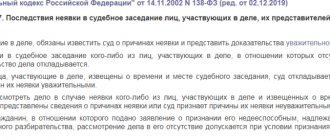The special procedure for considering a criminal case is a kind of criminal “simplification”. The procedure is accelerated due to the fact that many actions related to the need for competition between the prosecution and defense remain outside the scope of the proceedings.
Adversarialism disappears because the accused admits his guilt or begins to cooperate with the investigation. And although the law seems to accommodate those who promote justice, is such consideration really beneficial for the accused himself?
The facts and thoughts presented in the article will definitely help you understand what the special procedure for considering criminal cases is. Perhaps they will even help you figure out whether this is necessary in your particular case.
However, each case is individual, and when resolving this issue you should be guided by the advice of an experienced lawyer and, ultimately, by your own head. If you have not yet found a specialist who will defend you in court, we recommend that you do so as soon as possible.
Do you want to figure it out, but don’t have time to read the article? Lawyers will help
Entrust the task to professionals. Lawyers will complete the order at the cost you specify
27 lawyers on RTIGER.com can help with this issue
Solve the issue >
Special procedure for considering a criminal case: what is it?
The criminal process involves competition between the prosecution and defense. The goal is to find out whether the defendant is guilty of a specific crime.
This is one of the differences from civil proceedings: the latter may not be adversarial (writ proceedings), and it does not matter here whether you are really guilty or not. If you want to satisfy the plaintiff’s demands, even if you simply don’t want to argue, please, no one will interfere.
In legal proceedings regulated by the rules of the Code of Criminal Procedure, this is not the case: if you plead guilty, voluntarily taking on someone else’s guilt, the court will not pronounce a guilty verdict, not being sure of the fairness of such a decision. That is, the goal here is not to resolve the dispute, but rather to get to the bottom of the truth and assign a fair verdict (ideally).
Knowing this, it is easier to understand the phenomenon of the special procedure for considering a criminal case in the court of first instance, established in 2009 by Section 10 of the Criminal Procedure Code.
It is assumed that there are 2 procedures for entering into such proceedings: the consent of the accused with the charge brought against him and the conclusion of a pre-trial agreement on cooperation between the defense and prosecution (Chapters 40 and 40.1 of the Code of Criminal Procedure, respectively).
But the principle is the same: the accused admits his guilt (directly or indirectly, as in the case of a pre-trial agreement) in exchange for some mitigation of the sentence, which significantly facilitates and speeds up the work of the court and the burden on the judicial system as a whole.
The court does not delve into the details of the case, does not examine evidence and circumstances (except, for example, those that characterize the personality of the accused), since the parties refuse to compete.
That is why the consent of each party involved is important here. A special procedure in criminal cases does not apply to minors due to their incapacity. Also, in both cases, the defendant is exempt from paying court costs. To better understand how one procedure differs from another, we will consider each separately.
Pre-trial cooperation agreement
This issue is addressed in Art. 317.3 Code of Criminal Procedure. The agreement is drawn up by the prosecutor in the presence of the investigator, as well as the defendant’s defense attorney.
The document states:
- Date, place of compilation.
- Details of the prosecutor who enters into the contract and acts on the prosecution side.
- Information about the accused in the trial.
- Characteristics of the criminal act, indicating the time and date of its commission, and other circumstances.
- Provisions of the Criminal Code of the Russian Federation, which are applied to the suspect or accused subject to the latter’s compliance with the terms of the pre-trial agreement.
The agreement is signed by all parties: the accused, the prosecutor, his defense attorney, and the investigator.
Special procedure due to the accused’s admission of guilt
The special procedure for considering a criminal case due to the accused’s admission of guilt is regulated by Articles 314–317 of the Code of Criminal Procedure. Such consideration is available exclusively at the initiative of the defendant, which is logical. However, it is not always possible to admit your guilt and ask for a special procedure.
The Code of Criminal Procedure states that for this to happen, the crime with which the person is accused should not be classified as particularly serious. The wording of Article 314 does not concern the category of the crime, but the maximum possible sentence for it - 10 years. And this category includes crimes of minor gravity, moderate gravity and serious ones, according to Article 15 of the Criminal Code of the Russian Federation.
The second condition is the presence of consent to the transition to this order of the prosecution: the state prosecutor (prosecutor), the victim and the private prosecutor, who is the victim in cases of private and private-public prosecution (this can be slander, violence, beatings, bodily harm without loss to the victim ability to work and others).
And the legislator especially emphasized: the accused must take this step voluntarily, after consulting with his defense attorney, and must be aware of the nature and consequences of his petition.
And the consequences of such a petition are serious: a conviction. This is the only outcome for a criminal case, which is considered in a special manner. It would seem that you can appeal. But the scope of appeal is significantly narrowed: you will not be able to challenge the court’s conclusions based on factual circumstances, and in fact, you will not be able to change the verdict of guilty to acquittal.
Available grounds for appeal in an appeal under Article 389.15 of the Code of Criminal Procedure: violation by the judge of the rules of the Code of Criminal Procedure, incorrect application of the rules of the Criminal Code, imposition of an unfair sentence. This means that you can potentially only get a reduced sentence, but nothing more.
It is important to note here that the court, having reasonable suspicions of the innocence of the accused, can cancel the special procedure for considering a criminal case and move on to a general one. The latter, in turn, has at least two possible outcomes: a conviction or an acquittal.
The court will also deny a request for a special procedure if the special conditions set out above are not met. Replacement with the general order occurs not only at the initiative of the court, but also at the request of the accused himself, the prosecutor or the victim (that is, before the verdict is passed, you can change your mind).
The petition is submitted during familiarization with the case materials, which will be noted in the protocol of the procedure, or during the preliminary hearing, if it cannot be done without it (rules of Article 229 of the Code of Criminal Procedure).
If they begin to consider a case in a special order, then they take the general order as a basis and change it slightly.
Firstly, consideration without the accused and his defense attorney is not allowed. The procedure for the meeting is as follows:
- the accusation is announced (by the prosecutor or private prosecutor);
- the judge finds out whether the defendant understands the charge, whether he agrees with it, whether he wants to move to a special procedure, whether he understands what this will mean for him;
- aggravating and mitigating circumstances are examined, as well as those that make it possible to determine the personal qualities of the defendant (although they may not be examined);
- a guilty verdict is pronounced and the right to appeal is explained - only if no one objects and the court has enough evidence of the person’s guilt.
Many defendants who agree to a special procedure in a criminal case make this choice based on the fact that judges in this case do not have the right to impose more than two-thirds of the punishment (term, fine, etc.). However, is this really something worth admitting guilt for?
Practice shows that judges relatively rarely impose sentences exceeding two-thirds of the maximum; defense lawyers usually manage to achieve mitigation. Therefore, in this context, this is a very dubious advantage of the procedure.
And against the backdrop of the disadvantages - the issuance of an exclusively guilty verdict and the impossibility of changing it to an acquittal through appellate review - it is all the more worthwhile to think everything over very carefully.
It is advisable to make a decision to initiate such a procedure when you are guilty, plus there are many aggravating circumstances and you are facing a concrete sentence of a long sentence.
Application procedure
There is a sample of this document, according to which a petition is drawn up to consider a case of a criminal offense in a special legal procedure. You just need to take into account what term may be set in the sentence, whether it will exceed 10 years .
It is also important to know that the petition will be considered if all parties agree to this type of proceeding. What does the request indicate?
The petition is sent to the justice of the peace; there must be information about the person who is sending it. You need to write under what article the crime was committed. It is imperative to indicate that the offender understands all the features of special consideration and is familiar with Article 314 of the Criminal Code
The document is drawn up in four copies, since it must be sent not only to the judge, but also to the victim and the prosecutor. Another copy remains with the defendant. Perhaps there are more victims of a crime, then a copy needs to be prepared for each of them.
Reasons for introducing such a procedure
The previous edition of the Criminal Code contained several articles that provided for the possibility of imposing a more lenient punishment if the suspect cooperates and actively helps the investigation.
In reality, no regulatory rules have been developed for such a procedure. In fact, the decision on the issue of mitigation of the imposed punishment was within the exclusive competence of the presiding judge. Such a system created a situation where a citizen who provided full assistance to the investigation did not have any guarantees for a mitigation of the verdict.
Citizens who are direct participants in the court hearing must present information several times, which is especially inconvenient if there are many episodes in the case. In other words, in a situation where the following is established:
- the citizen fully admitted guilt for the crime committed;
- guilt was confirmed by the collected evidence during the pre-trial consideration of the case;
- the possibility of self-incrimination is excluded;
you still have to conduct a full-fledged judicial investigation. Such a procedure is a formality that takes a significant amount of time. Relatively recently, the concept of a special procedure for proceedings was introduced into the Criminal Code, which made it possible to eliminate such problems, expressed in the following:
- A citizen who cooperates with the investigation is guaranteed to receive the promised relief.
- The time of the main court hearing is significantly reduced.
Production specifics
The crime investigation process follows general requirements, which implies the following actions:
Have a question for a lawyer? Ask now, call and get a free consultation from leading lawyers in your city. We will answer your questions quickly and try to help with your specific case.
Telephone in Moscow and the Moscow region: +7
Phone in St. Petersburg and Leningrad region: +7
Free hotline throughout Russia: 8 (800) 301-39-20
- Sending necessary requests.
- Carrying out examinations.
- Search and interview of witnesses.
- Other necessary activities.
Upon completion of all processes provided for by law, an indictment document is generated and submitted to the prosecutor for approval. If the materials presented are sufficient to formally accuse a person of committing a crime, the case materials are sent to court.
One judge is appointed to consider the case, who gets acquainted with the information presented and determines the degree of readiness of the materials for consideration during the court hearing. A date is set for a preliminary court hearing, at which the injured party and the accused must be present.
During the preliminary hearing, the court clarifies the consent of the parties to consider the case in a special manner. If official consent is confirmed, the court renders a verdict based on the investigation materials available to it. In such a procedure, the stage of judicial investigation is completely excluded. The verdict is rendered in the general manner, with one peculiarity. The descriptive part of the verdict does not contain an evaluative description of the evidence presented.
Why can they refuse?
If the defendant has committed one of the following acts, he may be denied a request to consider the case in a special form:
- The citizen provided information only about his participation in the crime under investigation.
- The information received from the suspect is already known to the investigative authorities.
- He refused to testify against other participants in the crime.
- Provided false information.
- Did not fulfill one of the clauses of the concluded agreement.
In such a situation, the prosecutor decides to terminate cooperation with the suspected citizen, and the case materials will be considered in the general manner. On his own initiative, the judge may deny the defendant's request. The application will be refused if at least one of the following participants in the process does not agree with it:
- Defendant.
- The party affected by the crime.
- State prosecutor.
Therefore, in such situations it is better to cooperate with a professional lawyer.
Peculiarities
How does a court hearing proceed when a special procedure for considering a case is applied? The judge must name the defendant, explain his legal rights, and remind him of Article 51 of the State Constitution and Article 314 of the Criminal Code.
Then the judge checks whether there are any statements against the special procedure, because one of the participants in the meeting could change his decision. The indictment is read out
The defendant must confirm that he agrees to plead guilty. If he protests, the trial of the case begins in the usual manner; if not, the state prosecutor gives a characterization of the accused. It is necessary to indicate whether he is registered in psychiatry, narcology, and whether this citizen has any previous criminal records.
The next stage is when a proposal for punishment comes from the prosecutor and a proposal to mitigate it from the defense attorney. Then the criminal speaks with his last word, and the court goes to a meeting. After some time, the verdict is pronounced.
The special procedure involves a quick trial of the case and a more lenient sentence. But this is only possible under certain articles of the crime, with the consent of all parties to the case.







